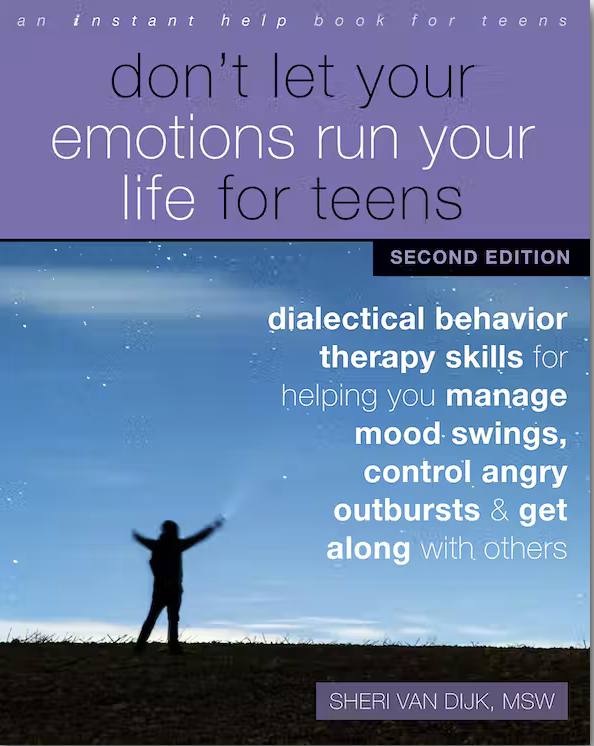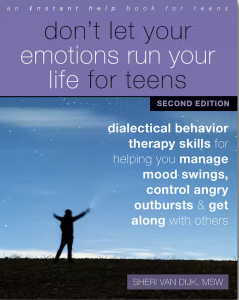DBT: Acceptance and Change

 Studies indicate that Dialectical Behavior Therapy (DBT) is “the best tool we have” for self-harming and suicidal adolescents. So what is it and why is it so effective? DBT teaches important social-emotional and resilience skills for life enhancement. Read more ›
Studies indicate that Dialectical Behavior Therapy (DBT) is “the best tool we have” for self-harming and suicidal adolescents. So what is it and why is it so effective? DBT teaches important social-emotional and resilience skills for life enhancement. Read more ›


 Dialectical behavior therapy (DBT) is a type of talk therapy (psychotherapy). It’s based on cognitive behavioral therapy (CBT), but it’s specially adapted for people who experience emotions very intensely.
Dialectical behavior therapy (DBT) is a type of talk therapy (psychotherapy). It’s based on cognitive behavioral therapy (CBT), but it’s specially adapted for people who experience emotions very intensely. 
 Dialectical behavior therapy teaches people to manage their ADHD symptoms using four basic DBT skills: mindfulness, distress tolerance, emotion regulation, and interpersonal effectiveness.
Dialectical behavior therapy teaches people to manage their ADHD symptoms using four basic DBT skills: mindfulness, distress tolerance, emotion regulation, and interpersonal effectiveness. 
 Some therapists may take a particular approach to psychotherapy, like cognitive-behavioral or psychodynamic. As a child and adolescent psychiatrist who trains and consults with many other clinicians, I often find myself fielding questions about what type of therapy would be the best fit for a particular person.
Some therapists may take a particular approach to psychotherapy, like cognitive-behavioral or psychodynamic. As a child and adolescent psychiatrist who trains and consults with many other clinicians, I often find myself fielding questions about what type of therapy would be the best fit for a particular person. 
 If you struggle to manage painful emotions or experiences like stress, anger, and rejection, dialectical behavior therapy (DBT) can help.
If you struggle to manage painful emotions or experiences like stress, anger, and rejection, dialectical behavior therapy (DBT) can help. 
 Now fully revised and updated, this workbook offers proven-effective dialectical behavior therapy (DBT) skills to help you find emotional balance and live the life you want.
Now fully revised and updated, this workbook offers proven-effective dialectical behavior therapy (DBT) skills to help you find emotional balance and live the life you want. 
 Parents seeking therapy for teenagers who self-harm or suffer from anxiety, depression or suicidal thoughts face an imposing thicket of treatment options and acronyms: cognitive behavioral therapy (C.B.T.), parent management training (P.M.T.), collaborative assessment and management of suicidality (CAMS), acceptance and commitment therapy (ACT) and others.
Parents seeking therapy for teenagers who self-harm or suffer from anxiety, depression or suicidal thoughts face an imposing thicket of treatment options and acronyms: cognitive behavioral therapy (C.B.T.), parent management training (P.M.T.), collaborative assessment and management of suicidality (CAMS), acceptance and commitment therapy (ACT) and others. 
 Suicide rates among ages 10-24, while stable from 2000 to 2007, jumped nearly 60 percent by 2018,
Suicide rates among ages 10-24, while stable from 2000 to 2007, jumped nearly 60 percent by 2018, 
 In this Voices of Compassion episode, we welcome back
In this Voices of Compassion episode, we welcome back 
 Self-injury, particularly among adolescent girls, has become so prevalent so quickly that scientists and therapists are struggling to catch up. About 1 in 5 adolescents report having harmed themselves to soothe emotional pain at least once, according to a
Self-injury, particularly among adolescent girls, has become so prevalent so quickly that scientists and therapists are struggling to catch up. About 1 in 5 adolescents report having harmed themselves to soothe emotional pain at least once, according to a 

